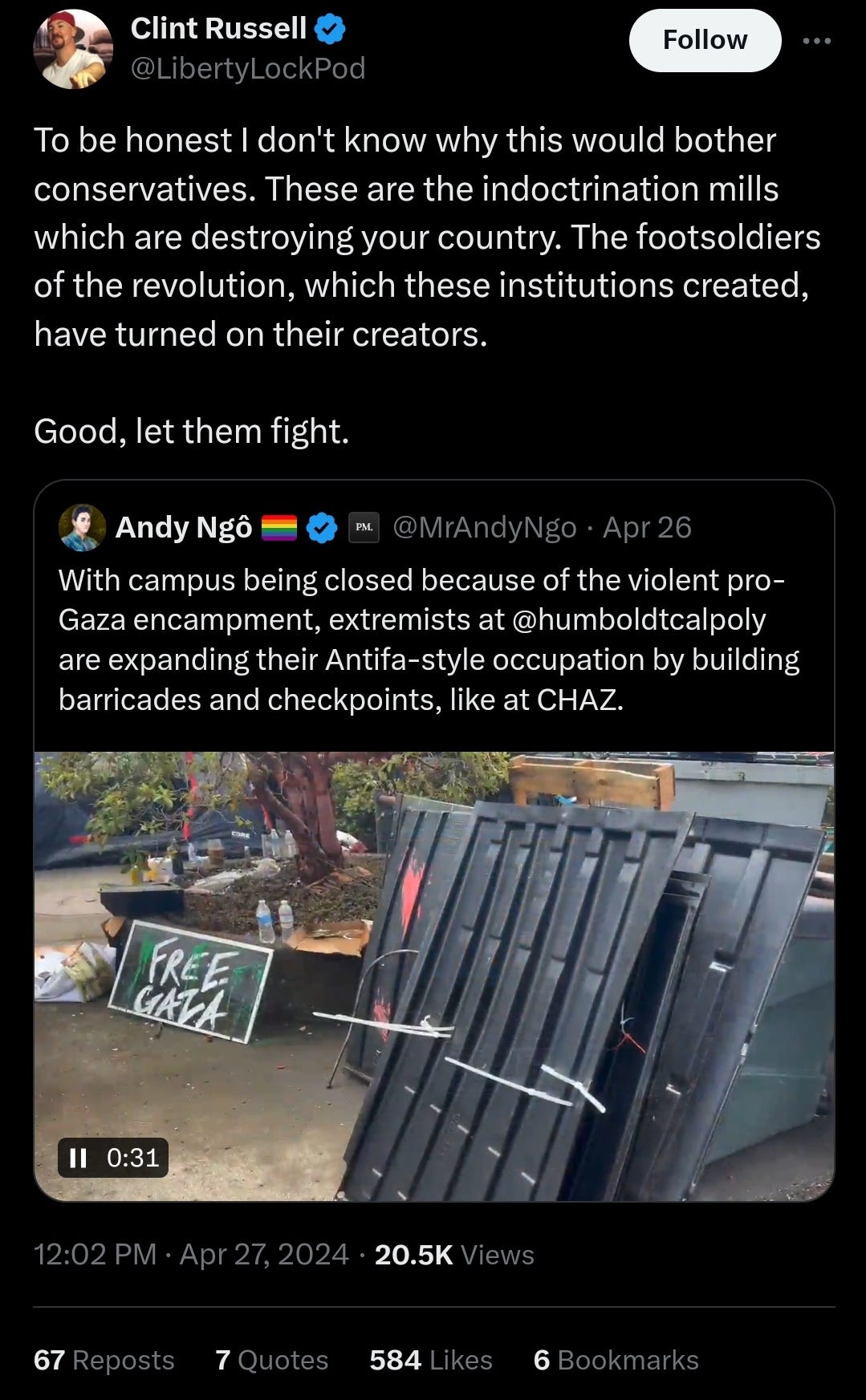The topic of taking back captured institutions provokes an interesting discussion, but when was the last time "marching through the institutions" worked for the political right? Spoiler alert: it works for the left because the tactic aligns with their agenda.
Time Stamps:
Introduction (0:00)
Working For NPR Would Be Fun? (1:59)
Ignorance From the Icebox is Their Strength (7:33)
Weak Little Fish in the Pond (9:06)
Frankenstein Turns On His Maker (15:44)
A Call From Anthony the Jipsqueak (17:56)
Working For NPR Would Be Fun?
Rich Cromwell is a senior contributor at The Federalist. This particular piece, The Right Shouldn’t Defund NPR, It Should Work There, was published by Thinkspot. We need to run through this thought experiment, and before long, we should notice how atrocious and vacuous it really is.
"For the first time in its 54-year history, NPR is enjoyable. The entertainment is not coming from the programming, though, but from the fallout from Uri Berliner’s whistleblower report at the Free Press about the ideological silo that is the broadcaster. Once Berliner got people’s attention, the extremely public record of insane proclamations from NPR’s CEO Katherine Maher came to light. That’s when the fun really began...
Take note of the word “entertainment,” and how it serves as the lense of Cromwell's view of the situation: ultimately unserious. Notice how this is unwittingly stressed with words like “fun” and “enjoyable,” as we just read through. Nevermind the “insane proclamations” or the “ideological silos.” No matter how much they “came to light,” the entertainment value took back whatever “light” we can speak of.
She can rally conservatives, who prefer to cede territory in a hopeless attempt at containment, into action. Alas, now is not the time for a really stupid and futile gesture, but something actually meaningful. Nonetheless, we’re just the guys to do it, especially since what I’m proposing will be even more entertaining than the current fracas.
There it is again, “entertaining.” And it captures Cromwell's ability to properly assess the situation to a degree we should find embarrassing. Who is he talking about, who “cedes territory?” As we saw with Tucker Carlson, those who drift away from the institutional narrative will be forced to “cede territory” to those who will. Even the perception of a drift, like that of Ronna McDaniel turns out to be enough in the circles of legacy media.
Apply for jobs in the most dreadful institutions in the land. Sue for discrimination when we don’t get them, because two can play at that game. Go to work for the government, which, I get it, but war is never easy. Land a gig in academia. Find your way inside an NGO."
“War is never easy,” but thankfully, Cromwell reminds us that it's a game. One “even more entertaining than the current fracas.” Sure, it didn't end well for Jordan Peterson. Or Michael Rectenwald. Or even Bret Weinstein. Definitely not for James Demore. What if two can't “play at that game?” Maybe it's not “entertaining” at all, but purely “dreadful.”
I would hate to say it if it didn't help. But this sounds like advice from an out of touch grandfather who doesn't see his own proposal for the fool's errand that it is. And I'm being generous to assume it's a matter of being out of touch, as opposed to a sadistic view of a meaningful task. One that Grandpa Cromwell admits is "dreadful." But he otherwise sounds like a man who's been stuck in an ice box since the Soviet Union fell.
Go subject yourself to an employer who hates you. See how far your discrimination suit can prove "two can play at that game." You'll look like a whiny little white man who forgot how privileged he really is in the eyes of anyone immersed in politically accepted stereotypes.
I'm not calling him Grandpa Cromwell to be mean-spirited, but to stress his commitment to a Cold War era of conservatism, which is completely naive and defined by blind optimism in a time where it's no longer warranted.
Sacrifice your well-being and your quality of life because we're at war, and "war is never easy." That's anything but "a really stupid and futile gesture." That's ultimately "meaningful."
But suppose Ms. Maher calls it a day after hiring one milquetoast conservative in the mold of David Brooks. Then what?
Ignorance From the Icebox is Their Strength
Fox News is perhaps the best example for the right "marching into the institutions," but what happened? They became a center-right outlet captured by government and massive corporate interests.
Michael Malice is fond of saying we don't need a majority, we just need an alternative. Lousy "official" media gave way to a right-wing talk radio empire, and more recently, Substack and Rumble. Whatever their faults, they are nowhere near as captured as Fox News.
Again, Grandpa Cromwell argues that two can play in the same game as institutional left-wing statists. How did that go for Pat Buchanan? How about Ronna McDaniel, who barely made it a day through NBC?
We've seen so many instances of things that would've been fine before the iterations of second-wave applied postmodernism, critical theory, and "social justice" ethos took over the left, and by extension, the institutions run by old school universal-values, modernist-leaning left-liberals.
What has worked for anyone else?
It seems for the "neoconservative right," it's the projection of strength. For the "populist right," the projection of a common struggle against the system. And for libertarians, the projection of intelligence, even if what they offer is compromised at best by those who have given them a hearing.
Weak Little Fish in the Pond
Shortly after Cromwell posted this piece on his Twitter-X page, Southwest Public Policy Institute President Patrick Brenner enthusiastically agreed and shared his own piece with the same essential conclusion.
Brenner correctly opens with a deeply troubling realization:
As the head of the American Federation of Teachers, [Randi] Weingarten wields tremendous power over the nation’s public schools.
But as we continue through Benner's framing of the situation suffers the same malinvested hope in a wasteland that has long withered away from its prime. It seems that a phrase like “tremendous power” is used for theatrical effect when the stakes are downplayed to offer a false assurance that public schools as an institution qualifies for salvation in any way.
When Oakland school board member Shanthi Gonzales resigned in disgust after getting nowhere past the chokehold of teachers’ unions, Brenner's response was to identify the episode as a symptom of a greater problem: right-wingers abandoning institutions where they're obviously unwelcome, powerless, and disillusioned, and going their own way.
Gonzales’ resignation is a symptom of a deeper underlying condition; when things go wrong, Conservatives abandon the institutions. This mass exodus is typical of the Right and needs to stop.
Why should it stop?
How long have you fought the “tremendous power” over public schools, and have gotten nowhere?
You're not projecting strength as the little fish in the big pond. You're not projecting intelligence if you're being harassed and shouted down. You're not winning the war when the best you've got is a butter-knife in front of a firing squad.
Gonzales, we're told, lacked “courage to stand up against such radicalization.” But was it really a matter of courage? When there's a clear dead end preventing a proper learning environment for students and a hospitable work environment for school board members, clearly outnumbered by those pushing “racial and social justice” issues into the curriculum, maybe it requires the courage to provide alternatives. What if it's best to let the city deal with the headache of saving face while having to hire another institutionalist who gives their schools a bad name?
To his credit, Brenner's piece does well in correctly diagnosing the institutional rot.
In the 1960s, a communist student activist Rudi Dutschke coined the slogan “the long march through the institutions,” a concept of working against established institutions by working within them. This subversive movement has served the Left well, as we see how transformative schools have become in recent decades. And the conversation is more polarized than ever.
What works for the left does not work for the right. Leftist subversion seeks that level of polarization, and often benefits from it. Conservatives want stability, and they have a weak record for anything relating to a “long march” anywhere, or anything “subversive,” with the possible exception of the MAGA movement qualifying for the latter.
Herbert Marcuse responded to Dutschke in the early 1970s. One passage is particularly frightening: “the fact that the radical Left has no equal access to the great chains of information and indoctrination is largely responsible for its isolation.”
If the Left of the 1970s was considered isolated, yet we see today how their abusive censorship and “misinformation” campaigns are effective at isolating the Right through mass media, it is worth questioning how this change happened. Yet we already know the answer. The long march through the institutions has resulted in this paradigm shift.
Marcuse's point was that the radical left found itself in an ideological silo while the neoliberal establishment left possessed “great chains of information and indoctrination” that was then impossible to compete with. As a result of the “march,” the rift between “social justice” radicals and the so-called “mainstream media” is much harder to discern. The “mainstream” was captured. Officially, they may not like Marxism, but they're easily indoctrinated.
The right may be isolated from many “mainstream” circles, but social media and other venues have the potential to break through the silos. The Donald Trump phenomenon has managed to attract the attention of “mainstream” media to a remarkable degree, eager to make hay out of any comment they find divisive. The silos aren't so occupied once people get to talking, whether in his defense or passionately opposed.
One hopes that conservatives would possess a sense of opportunity cost. In the time and effort they spend wasting their efforts trying to save these fallen institutions, they could have spent it building educational outlets in line with a vision of what the next generation needs to succeed. That time can be spent bypassing teachers’ unions and other institutional setbacks, and pay off quickly.
Even if the Marxian “march” was an unfortunate success story to serve their ideology, it was accomplished sporadically and patiently. It was done with a clear objective and a program. The right seldom offers a coherent program, but rather finds itself defined by its reaction to the left. We don't have the luxury to react with any “patience” for the harm done, or any such patience with red tape. And fortunately, that's not required.
Frankenstein Turns On His Maker
We recently covered the Lockean Proviso on homesteading, and how the "taxpayer ownership" model is most suitable for the present system. On this basis, CHAZ was an interesting experiment, but also an illegitimate occupation. If this equates to CHAZ, it goes beyond the threshold of a legitimate protest (which I'll readily defend when I see it).
Below, Andy Ngo compares the temporary closure of Humboldt State University to CHAZ due to a pro-Gaza encampment.
Returning to the homesteading issue, is the university system legitimately occupied in its current state? Are they not tax-funded, price-gougung propaganda factories? A high price to pay for a credential if you have any sense that you're not dealing with institutions comprised of reasonable people who are even close to providing an open environment for the exchange of ideas.
Clint Russell's “let them fight” response prompts many considerations.
How often do conservatives overstate their commitments to their (allegedly held) principles? All the time.
Perhaps the "conservative agenda" is far too vast for much of any effect. Choose your battles and don't interrupt your enemies while they turn on one another. Take the "W" even if it doesn't require your "help."
See Also:
External Resources:
The Right Shouldn’t Defund NPR, It Should Work There by Rich Cromwell
Conservatives, Stop Abandoning The Institutions by Patrick M. Brenner
OUSD board member Shanthi Gonzales resigns by Ashley McBride
The ‘Great Resignation’ hits school boards. Only 38% of members want to run for reelection by Kayla Jimenez
Episode 162 - Popular Liberty by Naturalist Capitalist
Donate to Mr. Menger:
Tip with Buy Me a Coffee
Tip with Cash App














